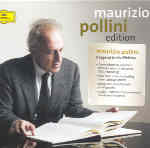Maurizio Pollini is, of course, one of the great pianists of our age, and while like all great artists he achieves varying results on recordings, the real issue with a collection such as this is how well it represents his achievement as a whole. In general, this selection of his recordings for DG gets the job done admirably. There are some real classics here: Bartók’s first two piano concertos, Beethoven’s Sonatas Op. 106 and 111, the Boulez Second Sonata, Liszt’s Sonata in B minor, Webern’s Variations, the Schoenberg solo piano music, Chopin’s Études Op. 25, and Stravinsky’s Three Movements from Petrushka. All of these recordings richly deserve the accolades that they have received over the years, and each says something valuable about Pollini’s qualities as an artist, from his dedication to contemporary music to his superbly finished technique, intellectual rigor, and his ability to see a work whole.
But there are surprises as well. His Schubert Sonata D. 959 and especially a superb Three Piano Pieces D. 946 reveal him as far more flexible, graceful, and able to make a melody “sing” than his formidable reputation otherwise warrants. The two works by Luigi Nono (Como una ola de fuerza y luz, and …sofferte onde serene…) are landmarks not just in Pollini’s discography but in the composer’s as well. Debussy’s Études show Pollini less concerned than we might expect with their purely technical and intellectual challenges or modernist harmonic elements, and instead returning to his Chopinesque roots (though his Chopin impresses for exactly the opposite reasons!). Mozart’s Piano Concerto No. 23 benefits from Pollini’s finely chiseled approach and Karl Böhm’s congenial accompaniments, and the same holds true for their generally impressive, grandly scaled Beethoven “Emperor” Concerto.
On the other hand, Beethoven’s Third and Fourth concertos and Brahms First, all under Claudio Abbado, do not efface memories of Pollini’s superior early recordings of the same works. Similarly, the live Schumann Piano Concerto under Karajan recorded in Salzburg in 1974 (included in a special bonus disc) has more urgency, warmth, and expressiveness than the official studio version with Abbado (also included here), but his recording of the same composer’s Fantasy in C shares the same fine qualities as his Schubert. The “other” bonus concerto, Chopin’s First, recorded live at the 1960 Chopin Piano Competition (the winning of which sent Pollini onto his international career), offers essentially the same performance as the official EMI recording from the same period, only in poor sound.
Even the performances where hard-core listeners may find the results less than stunning, either on account of the music itself (Manzoni’s Masse: Omaggio a Edgard Varèse) or the ready availability of as good or better competition (Chopin’s Second Piano Sonata and the “Moonlight” and “Waldstein” Sonatas of Beethoven), reveal the extremely high technical standard and seriousness of purpose that characterize everything that Pollini does. His Achilles’ heel, if he can be said to have one, lies in his somewhat flinty sonority, a lack of color that tends to hardness in his less than best work; but part of that problem also has to be laid to rest at the feet of DGs engineers, whose piano recordings from the 1970s through the present never have set an industry standard. Still, in this set there’s ample evidence that in Pollini we are dealing with an artist who has certainly earned his reputation for greatness, and whose finest recordings surely will withstand the test of time far into the future.
































